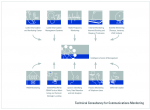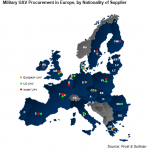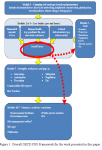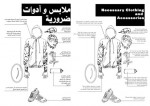Browse: Page 52
By europolice on 9. März 2011
Palermo 7 marzo 2011
The crisis in Libya is increasing tension in the Mediterranean. Several Italian, German, British and American war ships are headed towards Libya. At the same time in Sicily, Italian and U.S. military bases of Sigonella (CT), Augusta (Sr), Niscemi (Cl) and Birgi (Tp) were put in early warning ready to host aircraft and war ships in the event of attack against Libya. Hidden behind the screen of humanitarian intervention, the Western governments are preparing to get their hands on rich deposits of oil and natural gas that were nationalized after the 1969 revolution. This is a scenario already seen in Kosovo and Iraq. The opportunity of an unpopular regime (we are talking about the same Libyan regime that until few weeks ago was very welcome by the western cabinets) to „restore“ the political and economic power in areas of Planet not completely under the control of the majors Economic and Western financial groups. Continue reading „NO MILITARY INTERVENTION IN LIBYA“
Posted in English
By europolice on 8. März 2011
 Vor wenigen Tagen veröffentlichte die Gemeinsame Kontrollinstanz von Europol den öffentlichen Teil ihres Kontrollberichts zur Umsetzung des SWIFT-Abkommens. Der Kontrollbericht belegt, dass entgegen den im Abkommen vorgesehenen Beschränkungen EU-Zahlungsdaten auf der Grundlage viel zu abstrakt und umfassend formulierter US-Ersuchen in die USA übermittelt wurden.
Vor wenigen Tagen veröffentlichte die Gemeinsame Kontrollinstanz von Europol den öffentlichen Teil ihres Kontrollberichts zur Umsetzung des SWIFT-Abkommens. Der Kontrollbericht belegt, dass entgegen den im Abkommen vorgesehenen Beschränkungen EU-Zahlungsdaten auf der Grundlage viel zu abstrakt und umfassend formulierter US-Ersuchen in die USA übermittelt wurden.
Hierzu erklärt der Bundesdatenschutzbeauftragte, Peter Schaar: Bereits der rudimentäre öffentliche Teil des Kontrollberichts bestätigt meine Befürchtungen. Es bestehen massive Defizite. Die politisch Verantwortlichen auf europäischer und nationaler Ebene müssen umgehend dafür sorgen, dass die festgestellten Mängel beseitigt werden.
Unverständnis zeigt der Bundesdatenschutzbeauftragte für die Geheim-Einstufung großer Teile des Berichts durch Europol. Continue reading „SWIFT-Abkommen: Kontrollbericht belegt dringenden Handlungsbedarf“
Posted in Europol
By europolice on 8. März 2011
 Die EU ist zu Verhandlungen mit Belarus über Erleichterung der Visaordnung und Rückübernahmeabkommen bereit, teilte man in der Vertretung der Europäischen Union in Minsk mit.
Die EU ist zu Verhandlungen mit Belarus über Erleichterung der Visaordnung und Rückübernahmeabkommen bereit, teilte man in der Vertretung der Europäischen Union in Minsk mit.
Der EU-Rat bevollmächtigte die Europäische Kommission zu Verhandlungen mit Belarus über Unterzeichnung der Visa- und Rückübernahmeabkommen. Darüber beschloss man auf der Sitzung des Rates für Verkehr, Telekommunikationen und Energie.
Das Dokument erinnert, dass der Rat der EU-Außenminister in seinen Schlussfolgerungen zu Belarus vom 31. Januar die Wichtigkeit unterstrich, zwischenmenschliche Kontakte zwischen Belarus und der Europäischen Union zu vereinfachen.
Mitte November 2010 empfiehl die Europäische Kommission dem EU-Rat, ihr ein Mandat für die Verhandlungen über Abkommen zu Erleichterungen im Kurzvisum-Bereich und Rückübernahmeabkommen zu gewähren. Continue reading „EU ist zu Verhandlungen mit Belarus über Erleichterung der Visaordnung und Rückübernahmeabkommen bereit“
Posted in Various
By europolice on 8. März 2011
 Gregor Noll and Mariagiulia Giuffré
Gregor Noll and Mariagiulia Giuffré
Amongst observers to the unravelling of the authoritarian government in Libya, there is a far-reaching consensus that a government that uses indiscriminate lethal force to retain power is, as the diplomatic phrasebook has it, “unacceptable”. Yet, over the past six years, it has been perfectly acceptable for EU governments to outsource its border protection to an authoritarian leader with a dismal human rights record. Today, we should not only recall the fact that it is EU member states that are importing some 80% of Libya’s total oil production. We, the citizens of the EU, should also be reminded that for over three years now, we have relied on Gaddafi and his state apparatus to keep asylum seekers and other migrants away from our doors.
The Gaddafi Government’s treatment of migrants has been known to undercut human rights for a long time. In the past week, matters have escalated further. Human rights groups have reported atrocious racist violence against Sub-Saharan Africans in Libya, including those removed there by Italy on the basis of bilateral agreements with Libya designed to combat illegal immigration to Europe. Eritrean, Somali, and Sudanese refugees, accused of being mercenaries on the payroll of the government are summarily executed with knives and machetes. Prisons have been randomly bombed, including a facility in Misratah, where a large proportion of the immigrants and asylum seekers intercepted in the attempt to reach European soil are currently being detained. Continue reading „EU migration control: made by Gaddafi?“
Posted in Border Control, English
By europolice on 8. März 2011
 Val Swain looks at how the police are set to grab even more ‚intelligence‘ data
Val Swain looks at how the police are set to grab even more ‚intelligence‘ data
For the past six years a secretive, unaccountable, publicly-funded yet privately-run organisation has collected, collated and analysed vast amounts of personal data relating to political activists, organisers and protesters. By next summer, the £8 million-a-year operation run by the National Coordinator for Domestic Extremism (NCDE) will pass into the control of the Metropolitan Police. This is intended to increase democratic accountability and reassure concerned politicians. Perhaps it will – but on the ground little is likely to change.
Until now, the Association of Chief Police Officers (ACPO), a private company engaged in lobbying government and steering police policy, has operated three ‘domestic extremism’ units under the management of the NCDE. Continue reading „For the record: what the police will know about you“
Posted in English, European Police
By europolice on 7. März 2011
 While major political changes, heralding the end of the authoritarian regimes, are processing in the south of the Mediterranean area, governments and instances in the European union are especially concerned about how to protect themselves from “uncontrollable migration flows” potentially brought about by these upheavals. Experts and diplomatic services, which were unable to see the current political movements looming ahead, aren’t afraid to assert that thousands of migrants are likely to literally flood into European territories.
While major political changes, heralding the end of the authoritarian regimes, are processing in the south of the Mediterranean area, governments and instances in the European union are especially concerned about how to protect themselves from “uncontrollable migration flows” potentially brought about by these upheavals. Experts and diplomatic services, which were unable to see the current political movements looming ahead, aren’t afraid to assert that thousands of migrants are likely to literally flood into European territories.
In 2001, the EU adopted a “temporary protection” mechanism for country nationals who are victims of a natural catastrophe, of political turmoil in their country, or of an armed conflict, and who are in urgent need of a shelter in Europe. Yet, the European Commission hastened to tell that “there was, for now, no refugee flows arriving from Libya”. Meanwhile, the Commission sent patrols on its sea borders, via Frontex, to prevent potential refugees, considered as irregular migrants, from crossing the Mediterranean Sea ! Continue reading „Call on the European Union for a support intervention in the Mediterranean area“
Posted in Border Control, English
By europolice on 6. März 2011
 von Antonio Mazzeo
von Antonio Mazzeo
Die Installation von mächtigen Mikrowellen-Radars innerhalb israelischer Herstellung von italienischen Parkanlagen und Naturschutzgebieten zur Bekämpfung der Migrantenlandungen steht kurz bevor. Das neue Tiefensensorennetz für die Küstenüberwachung wird in das C4I-System der Finanzpolizei (Command, Control, Communications, Computer, Information) integriert sein
Dank der Mittel aus dem „Europäischen Fonds für die Außengrenzen“ hat die Generalkommandantur der Streitkraft im Rahmen des Programms 2007-2008 fünf hochentwickelte – von Elta System, einer von Israel Aerospace Industries Ltd (IAI) kontrollierten Gesellschaft geschaffene – EL/M-2226 ACSR (Advanced Coastal Surveillance Radar) gekauft. Die Radars wurden eigens für die Ortung von kleinen, schnellen Booten entwickelt. „Die vom System erfassten, hoch auflösenden Bilder finden Verwendung bei der Prävention von Migration, illegalem Fischfang, Drogenhandel, Terrorangriffen und Schmuggel, bei der Durchführung von Such- und Rettungsmissionen und zur Ortung von Zielen auf See, in der Luft und unter Wasser sowie von Signalen aus Radarantennen“, informiert die Managerschaft der israelischen Kriegsindustrie. Continue reading „Italien zieht mit israelischen Radars gegen die Migranten in den den Krieg“
Posted in Border Control, Software/ IT
By europolice on 6. März 2011
 Denis Solopov, who took part in the action outside the Khimki town hall on July 28, 2010, to protest the lawlessness of local authorities and the clear-cutting of the Khimki Forest, has been detained in Kyiv by local police.
Denis Solopov, who took part in the action outside the Khimki town hall on July 28, 2010, to protest the lawlessness of local authorities and the clear-cutting of the Khimki Forest, has been detained in Kyiv by local police.
The arrest took place on March 2, 2011, at the Kyiv Migration Service. Ukrainian authorities had just rejected Denis’s asylum application, a decision that Denis was planning to appeal in court. As stated on its web site, No Borders, a project of the human rights organization Social Action Center, suspects that migration service staff informed the police when Denis would be coming to their office, although they do not admit to this (see http://noborders.org).
On March 4, 2011, the Solomensky District Court in Kyiv ordered that Denis be kept in police custody for forty days. Continue reading „UA: The Authorities Have Taken Another Hostage in the Khimki“
Posted in English, European Police
By europolice on 4. März 2011
 During the last years quite a few initiatives have been taken in the fi eld of JHA cooperation, but their implementation has not been developed enough. This chapter explains the core ideas behind project Harmony.
During the last years quite a few initiatives have been taken in the fi eld of JHA cooperation, but their implementation has not been developed enough. This chapter explains the core ideas behind project Harmony.
Over the last decade, a lot of initiatives have been undertaken at the European level to improve the fi ght against organised crime. Although most of these initiatives contribute to the implementation of the ECIM, there is a lack of commitment and coherence among Member States which affects the effectiveness and the effi ciency of the fi ght against
organised crime.
The Belgian Presidency wants, in close cooperation with Europol (as a key player) and the UK and the Netherlands (because of their experience in intelligence-led policing), to streamline and integrate the already existing EU instruments into a more coherent and effective approach, resulting in a genuine European policy cycle. (download pdf from euro-police)
Posted in English, European Police, Europol
By europolice on 4. März 2011
Posted in Was tun?
By europolice on 4. März 2011
 3,4 Meter lang, maximal 200 Kilo Abfluggewicht und dieser Tage extrem unbeliebt: Das ist die autonome Drohne Camcopter S-100 der österreichischen Firma Schiebel.
3,4 Meter lang, maximal 200 Kilo Abfluggewicht und dieser Tage extrem unbeliebt: Das ist die autonome Drohne Camcopter S-100 der österreichischen Firma Schiebel.
Innsbruck, Wien – Hans Georg Schiebel, Erfinder der autonomen Drohne Camcopter S-100, spricht im TT-Interview über seine Erfindung und erklärt, warum Hoffnung einer der Motoren für sein Libyen-Geschäft war.
Herr Schiebel. Sie und Ihre Firma sind wegen eines Geschäfts mit Libyen ins Kreuzfeuer der Kritik geraten. Was ist dran an der Kritik, die von Peter Pilz erhoben wurde?
Hans Georg Schiebel: Ich empfinde die Diskussion als nicht ganz fair. Eigentlich geht es Herrn Pilz ja wohl weniger um unser Produkt, unser Geschäft mit Libyen oder meine Person. Vielmehr geht es ihm um die zuständigen Minister, denen er schaden möchte. Hier bin ich mit meiner Firma zwischen die Fronten einer politischen Auseinandersetzung geraten. Continue reading „Hans Georg Schiebel über „Fluch und Segen“ seiner Erfindung“
Posted in Border Control, Drohnen, Militaer
By europolice on 3. März 2011
 A group of people involved in radical action around the environment and other social struggles who have been involved with and been affected by recent exposes of infiltrators have come together to create a joint statement on how the issue has evolved and been represented in the media.
A group of people involved in radical action around the environment and other social struggles who have been involved with and been affected by recent exposes of infiltrators have come together to create a joint statement on how the issue has evolved and been represented in the media.
We are issuing this statement in solidarity with all those, in the UK and beyond, who are facing charges or have been affected in any way by the work of the undercover agents recently discovered.
We are a diverse group of individuals who have been involved in radical action, including actions based around the environment, for close to 20 years. This has included organising the Stirling Eco-village, the Camp for Climate Action, Earth First! Gatherings, anti-GM decontaminations, as well as many other forms of social struggle. We have been up trees, down tunnels and on the front line. We have taken beatings from the police and received convictions for the pleasure, and we make no apologies for our belief in direct political action.
The media frenzy that followed the collapse of the second Ratcliffe trial was met with an equally frenetic flood of articles and comments in the alternative media. Many of these were infuriating and/or very depressing, particularly as all the anti-media comments posted on Indymedia seemed to conveniently forget the fact that the site was one of the main sources of information used by the journalists covering the story. Continue reading „Collective statement from some individuals affected by recent infiltrations“
Posted in English, European Police, Was tun?
By europolice on 3. März 2011
 Friday the 4th of February was the last meeting day of the Interior Ministers of the largest EU Member States, U.S. Deputy Secretary of Homeland Security , and Attorney General of the United States. The participants discussed security in cyberspace and antiterrorist information policy.
Friday the 4th of February was the last meeting day of the Interior Ministers of the largest EU Member States, U.S. Deputy Secretary of Homeland Security , and Attorney General of the United States. The participants discussed security in cyberspace and antiterrorist information policy.
The guest who visited Kraków at the invitation of Jerzy Miller, Minister of interior and Administration of the Republic of Poland, included Brice Hortefeux, French Minister of the Interior, Overseas Territories, Territorial Collectivities and Migration, Thomas de Maiziere, German Minister of Interior, Roberto Maroni, Italian Minister of Interior, Theresa May, Home Secretary and Minister for Women and Equalities of the UK, Eric Holder, U.S. Attorney General, Jane Holl Lute, U.S. Deputy Secretary of Homeland Security, and Antonio Camacho Vizcaino, Spanish State Secretary for Security.
The participants held a discussion on issues proposed by Poland concerning both European and global security threats. Continue reading „G6 Interior Ministers in Poland“
Posted in English, European Police, Software/ IT
By europolice on 3. März 2011
 On the 1st march 2011 (migrants‘ strike day), activist in Bologna showed their solidarity to the people in Via Mattei’s detention centre. Immediately their was a reaction from inside. The people started with protests and burned matresses and tryed to get out.
On the 1st march 2011 (migrants‘ strike day), activist in Bologna showed their solidarity to the people in Via Mattei’s detention centre. Immediately their was a reaction from inside. The people started with protests and burned matresses and tryed to get out.
The activists from TPO social center manage to reach the Identification and Expulsion Center (CIE) in Via Mattei. They cross the first enclosure using a scale. They call the „LaRepubblica“ redaction and inform about the invasion „we’ve invaded the via mattei detention center asking for the liberation of all detained migrants“. Continue reading „Activists in Bologna invade in detention center“
Posted in Border Control, English, Was tun?
By europolice on 3. März 2011
 Speech from Cecilia Malmström, Member of the European Commission
Speech from Cecilia Malmström, Member of the European Commission
Discussion organised by The Center for Transatlantic Relations
Washington DC, 8 December 201
Ladies and Gentlemen,
We must go from being reactive to proactive. In defence matters soldiers too often base the organisation and the analysis on the latest war and not the coming one. Let’s not do the same mistake when it comes to internal security.
Global threats require global solutions. And the need for international cooperation has never been bigger.
One thing that always strikes me in discussions with American friends, whether they represent the Government or think tanks, is the very result oriented approach you have.
The title of this seminar is a good example. Your focus is „what’s in it for us“. Continue reading „The EU Internal Security Strategy – what does it mean for the United States?“
Posted in English, European Police
By europolice on 3. März 2011
 Die Redaktion des Newsletter Verteidigung hat das diesjährige »Unmanned Vehicles III« Forum 2011 der Deutschen Gesellschaft für Wehrtechnik e.V. genutzt, um ein paar Fragen an die anwesenden Vertreter des Unternehmens Diehl BGT Defence (DBD) zu richten, um mehr über den CAMCOPTER® S-100 zu erfahren.
Die Redaktion des Newsletter Verteidigung hat das diesjährige »Unmanned Vehicles III« Forum 2011 der Deutschen Gesellschaft für Wehrtechnik e.V. genutzt, um ein paar Fragen an die anwesenden Vertreter des Unternehmens Diehl BGT Defence (DBD) zu richten, um mehr über den CAMCOPTER® S-100 zu erfahren.
Der Helikopter UAV von Schiebel Elektronische Geräte GmbH soll in naher Zukunft bei der Deutschen Marine und auch beim Heer zum Einsatz kommen, und wurde schon mehrfach an andere Länder erfolgreich verkauft. Herr Ingo Schwaetzer, Leiter Marketing Unbemannte Systeme – Luft bei Diehl BGT Defence, hat unsere Fragen beantwortet.
Newsletter Verteidigung: Das Systemhaus Diehl BGT Defence (DBD) bietet das unbemannte Aufklärungssystem CAMCOPTER® S-100 für die Bundeswehr an, das eigentlich von dem österreichischen Unternehmen Schiebel Elektronische Geräte GmbH (SEG) entwickelt worden ist. Wie kommt es dazu? Continue reading „Interview Diehl BGT Defence“
Posted in Drohnen, Militaer
By europolice on 2. März 2011
 Am 6. Juli 2010 wurden drei Personen von einem Sondereinsatzkommando der Wiener Polizei (WEGA) in ihren Wohnungen überfallen. Sie wurden verhaftet, ihre Wohnungen wurden auf wüste Weise durchsucht und Gegenstände beschlagnahmt. Am selben Tag gab es einen Einbruch in ein selbstverwaltetes Vereinslokal – dort wurde ebenfalls alles abfotografiert und Verschiedenstes von den Verfolgungsbehörden mitgenommen. Zwei Wochen später wurde eine vierte Person verhaftet. In ihrer Abwesenheit zertrümmerte die Polizei mit Hilfe eines Rammbockes ihre Wohnungstür und beschlagnahmte im Zuge der Durchsuchung weitere Gegenstände.
Am 6. Juli 2010 wurden drei Personen von einem Sondereinsatzkommando der Wiener Polizei (WEGA) in ihren Wohnungen überfallen. Sie wurden verhaftet, ihre Wohnungen wurden auf wüste Weise durchsucht und Gegenstände beschlagnahmt. Am selben Tag gab es einen Einbruch in ein selbstverwaltetes Vereinslokal – dort wurde ebenfalls alles abfotografiert und Verschiedenstes von den Verfolgungsbehörden mitgenommen. Zwei Wochen später wurde eine vierte Person verhaftet. In ihrer Abwesenheit zertrümmerte die Polizei mit Hilfe eines Rammbockes ihre Wohnungstür und beschlagnahmte im Zuge der Durchsuchung weitere Gegenstände.
Posted in European Police, Justiz
By europolice on 2. März 2011
 Die Lage in den CIE (Zentren für Identifikation und Abschiebung) ist angespannt. In Gradisca haben es die Gefangenen nach einem Monat Revolten, brennenden Matratzen, Sabotagen und Sachschäden im wörtlichen Sinn geschafft, ihre Käfige zu zerstören. Weitere Revolten dieser Tage in Bologna, Trapani und Bari.
Die Lage in den CIE (Zentren für Identifikation und Abschiebung) ist angespannt. In Gradisca haben es die Gefangenen nach einem Monat Revolten, brennenden Matratzen, Sabotagen und Sachschäden im wörtlichen Sinn geschafft, ihre Käfige zu zerstören. Weitere Revolten dieser Tage in Bologna, Trapani und Bari.
Seit der Eröffnung des CIE in Gradisca vor fünf Jahren kam es zu etlichen Aufständen, bei denen immer wieder Teile des Lagers unbrauchbar gemacht wurden, sodass weniger als die Hälfte der Anstalt funktionsfähig war. Das Ankommen junger Leute, die die letzten Revolutionen im Maghreb erlebt hatten, brachte das Pulverfass zum Explodieren.
Seit einer Woche sind die Brände zu einem alltäglichen Phänomen geworden. Stein für Stein, Mauer für Mauer haben die Sans-Papiers schrittweise alle Zellen zerstört. Continue reading „Revolten in italienischen Abschiebelagern“
Posted in Border Control |
By europolice on 2. März 2011
 Vier Helikopter-Drohnen, die eine Firma aus Wien der libyischen Regierung verkauft hat, haben am Dienstag für Aufregung bei der Nationalratssitzung gesorgt. Der Grün-Abgeordnete Peter Pilz bezeichnete die vom Wirtschaftsministerium genehmigte Lieferung als illegal und Verstoß gegen das Kriegsmaterialgesetz. Offenbar setzt das Gadafi-Regime die Überwachungsdrohnen zum Aufstöbern von Aufständischen ein. Laut Hersteller sind die ferngesteuerten Helikopter unbewaffnet und wurden von Libyen zur Grenzkontrolle angeschafft.
Vier Helikopter-Drohnen, die eine Firma aus Wien der libyischen Regierung verkauft hat, haben am Dienstag für Aufregung bei der Nationalratssitzung gesorgt. Der Grün-Abgeordnete Peter Pilz bezeichnete die vom Wirtschaftsministerium genehmigte Lieferung als illegal und Verstoß gegen das Kriegsmaterialgesetz. Offenbar setzt das Gadafi-Regime die Überwachungsdrohnen zum Aufstöbern von Aufständischen ein. Laut Hersteller sind die ferngesteuerten Helikopter unbewaffnet und wurden von Libyen zur Grenzkontrolle angeschafft.Laut Pilz würden die Drohnen von der militärischen Elite- Einheit von Staatschef Muammar al- Gadafi, der 32. Brigade, eingesetzt. Es sei dies „die brutalste Einheit des Regimes“, schreibt der Abgeordnete auf seiner Website . Seiner Meinung nach verstoße die Lieferung der Firma Schiebel mit Sitz in Wien gegen das Kriegsmaterialiengesetz, da der Verkauf zwar vom Wirtschaftsressort, aber ansonsten weder von Außen- noch Innen- oder Verteidigungsministerium genehmigt worden sei. Continue reading „Gadafi setzt Drohnen aus Wien im Bürgerkrieg ein“
Posted in Drohnen
By europolice on 2. März 2011
 Vor nun knapp mehr als einem Jahr wurde der Berliner Sliman Hamade bei seiner Festnahme von Polizisten getötet. Mit offensichtlich massiver Gewalt wurde er schon in Handschellen zu Tode misshandelt. Die Familie blieb bis vor kurzem weitgehend stumm angesichts des gewaltigen Staatsapparates, der sich selbst vor Bestrafung zu schützen weiß. Nun jedoch finden sich in Berlin immer mehr Menschen, die gemeinsam als Betroffene oder einfach nur solidarisch gegen Polizeigewalt arbeiten wollen. Motiviert durch die breite Solidarität mit den Angehörigen des an Silvester vor zwei Jahren ermordeten Dennis J. will ein Bündnis am 5. März in Berlin eine Demonstration zur Erinnerung an die Opfer von Polizeigewalt veranstalten. Continue reading „Berlin: Demo gegen Polizeigewalt“
Vor nun knapp mehr als einem Jahr wurde der Berliner Sliman Hamade bei seiner Festnahme von Polizisten getötet. Mit offensichtlich massiver Gewalt wurde er schon in Handschellen zu Tode misshandelt. Die Familie blieb bis vor kurzem weitgehend stumm angesichts des gewaltigen Staatsapparates, der sich selbst vor Bestrafung zu schützen weiß. Nun jedoch finden sich in Berlin immer mehr Menschen, die gemeinsam als Betroffene oder einfach nur solidarisch gegen Polizeigewalt arbeiten wollen. Motiviert durch die breite Solidarität mit den Angehörigen des an Silvester vor zwei Jahren ermordeten Dennis J. will ein Bündnis am 5. März in Berlin eine Demonstration zur Erinnerung an die Opfer von Polizeigewalt veranstalten. Continue reading „Berlin: Demo gegen Polizeigewalt“
Posted in Was tun? |



















